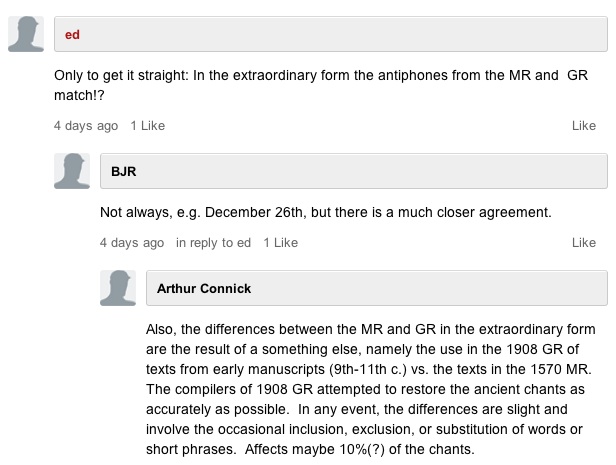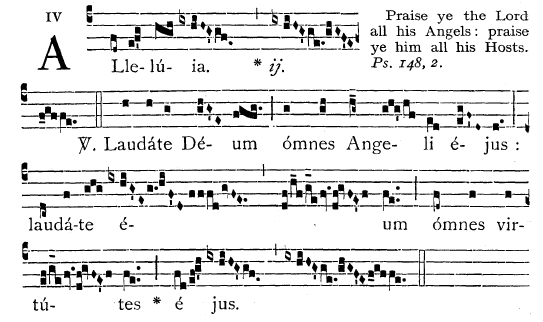Graduale Texts vs. Roman Missal — — 1962 Missal !!!
-
In my recent article on NLM (explaining the difference between the Missal Propers and the Gradual Propers in the Ordinary Form), we find these comments:

Many readers of this forum are (probably) already aware of this fact.
However, for those who are not, there are sometimes slight differences in the 1962 Graduale Romanum from the 1962 Missale Romanum.
The reason behind this (I've always been told) is the Graduale texts are usually more ancient, and it is not worth changing the music (that is, doing damage to the music) to match the Missale texts. (Some Graduale texts even come from the "Vetus Itala" as opposed to the Vulgate).
The differences are VERY minor, usually things like "ex Aegypto" vs. "de Aegypto."
Here is one such difference from the 2nd Sunday after Epiphany (1962):

-
By the way, although I did not put this in the article (for various reasons), it is difficult to understand what Most Rev. Bishop Serratelli means (see this correspondence) when he says the Missal Propers are a 3-year cycle, and the Graduale Propers are not.
Perhaps I am not understanding what he is getting at. Perhaps he is referring to the daily Masses? But this cannot be, because (for instance) the daily Antiphons are usually taken from the previous Sunday or the commons (e.g. in Ordinary time).
Correct me if wrong, but:
A. The Missal Propers are not a 3-year cycle (at least regarding the Sundays, Feasts, and Solemnities) — they are basically the same as the Graduale texts.
B. The Graduale Propers often have Year A, B, and C versions (e.g. 2nd Sunday of Ordinary Time, Communion chant). -
Yes, you are right.
A. The Missal Propers do not follow a 3-year cycle. There is always a fixed set of a single Entrance Antiphon and a single Communion Antiphon. In Ordinary Time two Communion Antiphons are given (one from the Old Testament and one from the New Testament), and you can choose between the two.
The Entrance Antiphons from the Missal usually match with those from the Graduale. Only a few times a second option is given, but this second option is never tied to a specific year from the 3-year cycle.
The Communion Antiphons usually don't match with those from the Graduale. I even thought the usually refer to the readings of year A, but I should check this to be certain.
B. Yes, the Graduale Romanum sometimes assigns antiphons to specific years from the 3-year cycle. -
I don't pretend to know exactly what the Bishop of Paterson means when referring to the "correspondence of the Roman Missal to the liturgical texts of the current liturgical year." By "current liturgical year" does he mean the liturgical year according to the reformed Roman Calendar (as opposed to the 1962 calendar) or the current year of the three-year Sunday cycle of readings from the Lectionary? In a cursory glance at the Missal propers I noted two options for the Communion Antiphon in Ordinary Time where, although not specified as such, one appears to relate more specifically to the Gospel for a particular year of the three-year cycle, the other being more general. Of course a more apt correspondence can be seen in the Ordo cantus Missae (as reflected in the 1974 Graduale Romanum) which contains adaptations of the propers not only for the three-year cycle (as JMO notes) but also for the two-year cycle of readings for weekdays. To say that the antiphons in the Missal were provided to "accompany the processions [sic] at the Entrance and the procession to receive Communion" is slightly confusing unless qualified by something like "in the absence of singing," in other words at a missa lecta. And even so where the people do not recite the antiphon and there is no lector or other person to read it, the priest himself recites the Entrance Antiphon after he reaches the sanctuary and the Communion Antiphon after he makes his own Communion and before distributing Holy Communion to the people.
Looking back at the Latin GIRMs from the present editio typica tertia to the first edition (1969) it appears clear to me that the Missal antiphons were never intended to be sung: their very presence in the Missal indicates that, since all the sung propers are to be found in the Graduals and other collections of song, and those parts that are omitted at a Mass without singing (i.e. the Alleluia and the Offertory) are not in the Missal.
At least the present GIRM acknowledges the Antiphon of the Introit from the Roman Gradual as well as the Psalm, but the placement of the Roman Missal antiphon first in option 1 adds unnecessary confusion. -
I meant to whisper this.
Welcome to the MusicaSacra Forum!
To participate in the discussions on Catholic church music, sign in or register as a forum member, The forum is a project of the Church Music Association of America.
Categories
- All Discussions21,292
- General Music Discussion8,303
- Job Openings217
- Management of Music Programs852
- Choral Matters534
- Church Documents and Rubrics528
- CMAA Notes304
- Events731
- For Newcomers: Read First26
- Sacred Polyphony550
- Hymnody876
- Gregorian Chant: General2,712
- ↳ Graduale Romanum and Liber Usualis370
- ↳ Graduale Simplex60
- ↳ Semiology64
- Vernacular Plainsong698
- Anglican Use and Anglican Chant68
- Organ, Other Instruments and Repertoire438
- New Composition/Works in Progress1,303
- Recordings234
- Music for Hispanic Ministry162
- Music Education: Children213
- Music Education: General222
- News Items245
- Positions Wanted3
- General Discussion: Catholicism740
- Amusements177
- General Discussion1,037
- Opinions119


